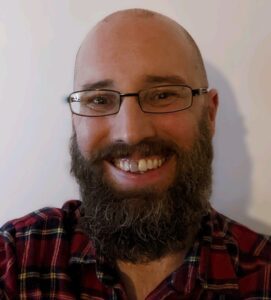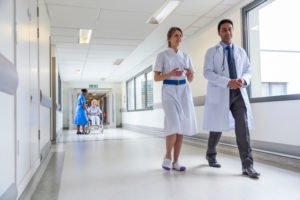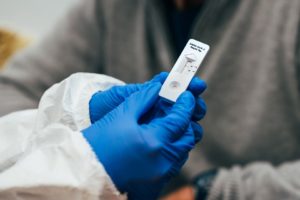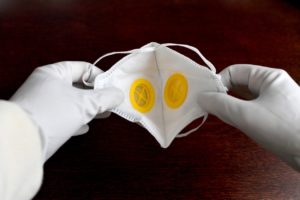SHP AWARDS
SHP Awards Interview with Matt Hall: A Trailblazer in Health and Safety
Matt Hall, Associate Director of Health and Safety at Imperial College Healthcare NHS, won the Trailblazer in Health and Safety accolade at the SHP Awards in December 2022 for work he completed while at Royal Free London NHS. He speaks to SHP about his role in driving fit testing and PPE provision at the height of the COVID-19 pandemic…

Matt Hall
By his own admission, Matt Hall almost fell into health and safety by accident while working in a laboratory.
However, as his SHP award is testament to, his critical OSH contribution to the Royal Free London NHS’ response to COVID-19 was anything but accidental.
In the early stages of the pandemic Matt headed up a small response team and worked closely with colleagues as well as senior management to ensure NHS staff received fit-tested PPE so they were fully protected to carry out essential duties.
“The important thing for me is that it could be seen that I have done all of this, but there were a lot of people who were helping me,” he says.
“There were probably a lot of people around the country who were having the same journey and I am lucky that somebody nominated me for this [award]. Also, there were people who freed me up who took things off me so I could do this. It was a huge team effort.”
Taking a leading role
Even so, speaking to Matt about the hospital’s response, it’s clear he had a leading role. Pre-pandemic, Matt explains how the Royal Free London, like other NHS hospitals, had sourced a wide variety of masks.
When the virus started to take hold and some people suggested that fit testing should be abandoned in favour of fit checking, Matt stepped up and advised against this move.
Matt had spent a year at University College London (UCL) before taking up his post at the Royal Free London where he’d done extensive fit testing.
 “In healthcare, you are so focused on looking after others, sometimes you need somebody from the outside to come in and go, ‘How can we protect you?’” he says on his decision to approach the infection, prevention and control (IPC) team which was managing PPE provision, and offer his services.
“In healthcare, you are so focused on looking after others, sometimes you need somebody from the outside to come in and go, ‘How can we protect you?’” he says on his decision to approach the infection, prevention and control (IPC) team which was managing PPE provision, and offer his services.
“I said, ‘Look, I can help manage it. We agree that fit testing is the right way to go and that we don’t want to go to fit check’ Then it was about saying, ‘Here’s a way that we can do it. It’s going to be stressful and it’s going to be a lot of effort, but it is worthwhile doing’.”
Senior support
Matt says his decision to fit test the hospital’s CEO and number of chief nurses helped win the support of senior staff who soon advocated his approach. “They also understood how important it was because they felt more confident in the kit,” he adds.
From the outset, Matt had no illusions about the scale of the task faced, which included needing to fit test 6,000 NHS staff, coupled with a shortage of staff that was trained to fit test and a shortage of appropriate masks.
Matt explains how the hospital only had limited fit-testing kit, so he drew on his contacts at UCL where he knew there were cupboards full of kit not being used and secured them. He also spoke to a contact in pharmacy and provided them with the recipe to make the testing solution. By the time the national team made up supplies, the Royal Free London had built up a surplus.
 “That resolved our immediate problem because that meant rather than just one person at a time, we could fit test multiple people and I could start to think about training additional people,” he says.
“That resolved our immediate problem because that meant rather than just one person at a time, we could fit test multiple people and I could start to think about training additional people,” he says.
Matt recalls how he only had one IPC nurse to help him fit test but he soon faced competing demands on his time. He also couldn’t afford to draw clinical staff away from patient care so instead drew initially on a mix of nurses that needed to be protected from front-line work and admin staff. By week three, they were joined by a large number of medical students.
Building ‘an army’
“That was probably where it helped us the most because they were able to do 24-hour rotas,” he explains. “We were able to get people who could do the 2am shift so I didn’t need to be there.”
Gradually, he built up an army of fit testers that now numbers more than a 100. Looking back Matt says the biggest challenge at the outset was that nobody knew how bad COVID-19 was. Despite the fear factor, he commends his colleagues who were desperate to come in and help out even though they were genuinely concerned about their own health.
“Part of my job was to spend 20 to 30 minutes with somebody when you are fit-testing them and giving them simple instruction, giving them confidence in their kit and the chance to ask questions,” he recalls.
“This included really senior people who would be controlling operating theatres and doing things that will save lives. They were looking to you to look after them.”
On the back of this, Matt’s team also had to convince front-line workers that wanted to wear the fit-tested masks all the time that a surgical mask would be a suitable substitute in some circumstances and would still keep them safe. This was critical because otherwise the hospital would have quickly got through its limited supply before replacements arrived.
“That was where having IPC came in because they were the people who would help me to interpret things. They were the experts and without them there is no way I’d have understood what I needed as easily as I did,” he says.
Ongoing challenges
When the second set of masks supplied to the London region arrived, Matt found that he was getting a lower pass rate, particularly for women and BAME staff. He fed this back to the manufacturer and says they came back with a better design, which became one of their go-to-models.
Matt also got his fit testers to participate in a national programme, which resulted in them collecting between 500 and 1,000 different face measurements and feeding the information back to manufacturers so that future mask designs fitted a wider range of face shapes.
 In addition to improving inclusivity, Matt also helped to save thousands of pounds, not to mention tonnes of waste sent to landfill, by reducing the dependence on disposal masks.
In addition to improving inclusivity, Matt also helped to save thousands of pounds, not to mention tonnes of waste sent to landfill, by reducing the dependence on disposal masks.
As he explains, one of the main issues was that single-use masks were a tight fit on staff and left pressure marks when they were removed. In contrast, reusable masks didn’t because they came with big rubber seals in different shapes and sizes.
“The first driver was to have a mask that would cause less pain and would be less likely to be changed because we’re just replacing filters,” he explains.
“There would still be times from an IPC perspective where we would want to use a disposable mask, but the majority of times we could use a reusable one. I approached a number of manufacturers and they sent me masks. We would fit test them and get staff to tell us which felt best for them and provide feedback to the manufacturers.”
Later Matt became involved in an NHS improvement programme on fit testing and wrote a competency checklist that’s now formed part of a wider resource pack.
“I wanted a way that we could record somebody’s competency,” he says. “But also, if we were doing annual assessments, we could go back and look at it.”
Thoroughly deserved
Matt’s award is thoroughly deserved and it is clear his strong people skills played an important part in Royal Free London’s approach to fit testing and ultimately the protection of staff.
It’s an asset that the health and safety person he assisted while undertaking research work in the laboratory recognised and led to him retraining as an OSH professional.
“I could see where I could have a benefit to an organisation,” he says looking back. “You get to speak to everyone and you get to go around all the different areas and see what’s going on and understand the bigger picture.”
Winners and judges of the SHP Awards 2022 have been invited to attend this year’s Safety & Expo in May. Get your free ticket now!
SHP Awards Interview with Matt Hall: A Trailblazer in Health and Safety
Matt Hall speaks to SHP about his role in driving fit testing and PPE provision at the height of the COVID-19 pandemic...
Nick Warburton
SHP - Health and Safety News, Legislation, PPE, CPD and Resources Related Topics
Are you meeting your responsibilities as a buyer of PPE and safety equipment?
Inclusivity in PPE: The manufacturer’s perspective
Future-proofing safety: Five trends shaping the PPE landscape of tomorrow


 “In healthcare, you are so focused on looking after others, sometimes you need somebody from the outside to come in and go, ‘How can we protect you?’” he says on his decision to approach the infection, prevention and control (IPC) team which was managing PPE provision, and offer his services.
“In healthcare, you are so focused on looking after others, sometimes you need somebody from the outside to come in and go, ‘How can we protect you?’” he says on his decision to approach the infection, prevention and control (IPC) team which was managing PPE provision, and offer his services. “That resolved our immediate problem because that meant rather than just one person at a time, we could fit test multiple people and I could start to think about training additional people,” he says.
“That resolved our immediate problem because that meant rather than just one person at a time, we could fit test multiple people and I could start to think about training additional people,” he says. In addition to improving inclusivity, Matt also helped to save thousands of pounds, not to mention tonnes of waste sent to landfill, by reducing the dependence on disposal masks.
In addition to improving inclusivity, Matt also helped to save thousands of pounds, not to mention tonnes of waste sent to landfill, by reducing the dependence on disposal masks.